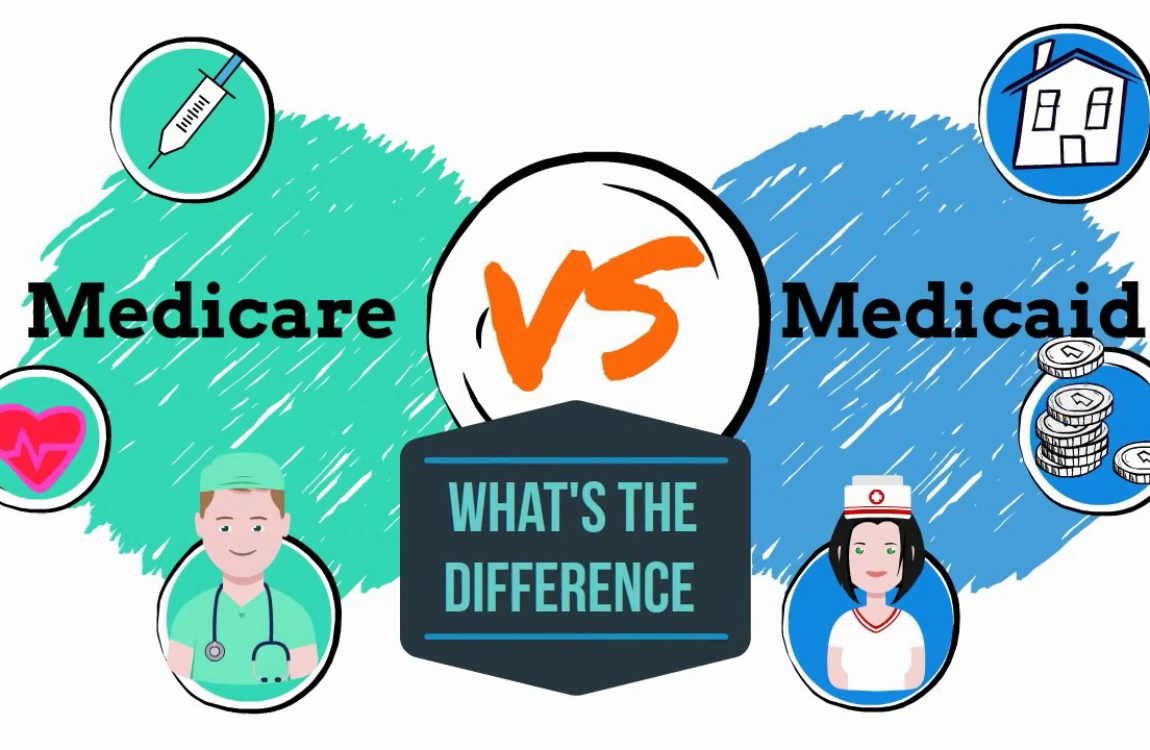As a resident of the Inland Empire or Chino Valley, you may have heard of both Medicare and Medicaid, but do you know the differences between the two? While both programs provide essential healthcare coverage, they serve different populations and offer different benefits. At Joseph Insurance Broker LLC, we aim to help you understand these two programs, so you can determine which one is right for you or your loved ones. In this blog, we will break down the key differences between Medicare and Medicaid, their eligibility requirements, and how they work together for those who qualify for both.
What is Medicare?
Medicare is a federal health insurance program primarily designed for:
- People aged 65 and older: The majority of Medicare beneficiaries are seniors who qualify based on age.
- Certain younger individuals with disabilities: People under 65 who have been receiving Social Security Disability Insurance (SSDI) for 24 months are also eligible.
- Individuals with End-Stage Renal Disease (ESRD): This includes people with permanent kidney failure requiring dialysis or a kidney transplant.
Medicare is divided into four parts:
- Part A (Hospital Insurance): Covers inpatient hospital stays, care in a skilled nursing facility, hospice care, and some home health care.
- Part B (Medical Insurance): Covers doctor visits, outpatient care, preventive services, and medical supplies.
- Part C (Medicare Advantage): Offers an alternative way to receive your Medicare benefits through private health plans that combine Part A, Part B, and usually Part D (prescription drug coverage).
- Part D (Prescription Drug Coverage): Provides coverage for prescription medications.
Eligibility for Medicare
- Automatic Enrollment: If you’re receiving Social Security benefits, you will typically be automatically enrolled in Medicare Parts A and B when you turn 65.
- Manual Enrollment: If you’re not receiving Social Security, you’ll need to sign up for Medicare during your Initial Enrollment Period (IEP), which begins three months before your 65th birthday and ends three months after your birthday month.
What is Medicaid?
Medicaid is a joint federal and state program that provides health coverage to:
- Low-income individuals and families: Medicaid is designed to assist those with limited income and resources, including children, pregnant women, parents, seniors, and individuals with disabilities.
- Those meeting specific eligibility criteria: Each state sets its own eligibility requirements within federal guidelines. This means that Medicaid benefits and eligibility can vary from state to state.
Medicaid covers a wide range of health services, including:
- Doctor visits and hospital stays
- Long-term care services: Medicaid is the primary source of coverage for long-term care, such as nursing home care.
- Home and community-based services: This includes services that allow people to remain in their homes or community instead of entering a nursing home.
- Prescription drugs, dental, and vision care: While these benefits vary by state, Medicaid often covers services not included in Medicare.
Eligibility for Medicaid
- Income-Based Eligibility: To qualify for Medicaid, your income must be at or below a certain level, which varies by state.
- Resource Limits: Many states also consider your resources (such as savings and property) when determining eligibility.
- Medically Needy Programs: Some states offer Medicaid to individuals with higher incomes who have significant medical expenses that reduce their disposable income.
Key Differences Between Medicare and Medicaid
- Target Population:
- Medicare is primarily for seniors and certain disabled individuals, regardless of income.
- Medicaid is for low-income individuals and families, with eligibility based on income and resources.
- Funding:
- Medicare is funded by federal payroll taxes, premiums paid by beneficiaries, and general federal revenue.
- Medicaid is jointly funded by the federal government and state governments, with each state administering its own program.
- Coverage:
- Medicare generally covers acute care services like hospital stays, doctor visits, and short-term rehabilitation. It also includes prescription drug coverage through Part D.
- Medicaid offers broader coverage, including long-term care services, home and community-based services, and additional benefits like dental and vision care.
- Costs to Beneficiaries:
- Medicare beneficiaries pay premiums, deductibles, and coinsurance for many services. However, there are programs available to help low-income Medicare beneficiaries with these costs.
- Medicaid typically has low or no cost-sharing for beneficiaries, though this can vary by state.
Dual Eligibility: Medicare and Medicaid Working Together
Some individuals qualify for both Medicare and Medicaid, known as being “dual eligible.” If you’re dual eligible, Medicare is your primary payer for most services, and Medicaid acts as secondary coverage to fill in the gaps.
- Medicare pays first: It covers the majority of your healthcare expenses, including hospital stays, doctor visits, and prescription drugs.
- Medicaid pays second: Medicaid can help cover Medicare premiums, deductibles, coinsurance, and services not covered by Medicare, such as long-term care.
For dual eligibles, Medicaid may also offer benefits like personal care services and medical transportation that Medicare doesn’t cover.
Choosing the Right Coverage for You
Understanding whether Medicare, Medicaid, or both are right for you depends on your specific healthcare needs, income, and resources. For those who qualify for both programs, coordinating benefits can maximize your coverage and minimize your out-of-pocket costs.
At Joseph Insurance Broker LLC, we specialize in helping Inland Empire and Chino Valley residents navigate their Medicare and Medicaid options. Our expert team can help you understand your eligibility, compare plans, and find the best coverage to meet your needs.
Contact Us Today
If you’re unsure which program is right for you or need assistance with your healthcare coverage, contact Joseph Insurance Broker LLC at 714-473-8086. Our knowledgeable team is here to provide personalized guidance and ensure you’re making informed decisions about your health insurance.





